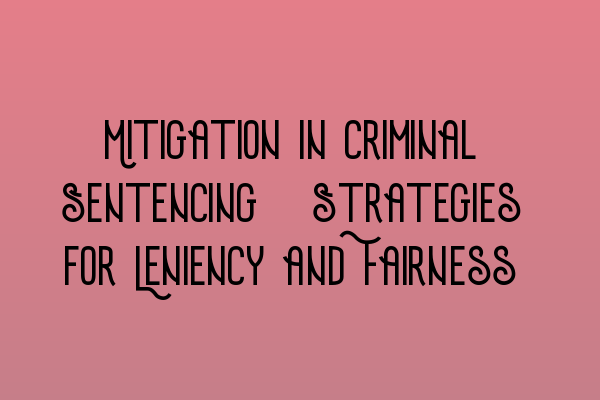Mitigation in Criminal Sentencing: Strategies for Leniency and Fairness
When facing criminal charges, the prospect of sentencing can be daunting. However, it is important to remember that there are strategies available to lessen the severity of the punishment. One such strategy is mitigation, which aims to present factors that may result in a more lenient sentence. In this article, we will explore mitigation in criminal sentencing and discuss key strategies that can help achieve fairness in the process.
Understanding Mitigation
Mitigation refers to the presentation of evidence or arguments that aim to persuade the court to impose a less severe sentence. The goal of mitigation is to provide the court with a nuanced understanding of the defendant’s circumstances and actions, highlighting factors that may justify a reduced punishment. Mitigation is a critical part of the criminal sentencing process and plays a vital role in ensuring fairness and proportionality in judgments.
Key Strategies for Mitigation
1. Personal Circumstances: One effective strategy in mitigation is to present the defendant’s personal circumstances to the court. This may include factors such as the defendant’s age, health, family responsibilities, and community involvement. By demonstrating that the defendant’s actions were out of character, influenced by external factors, or had unintended consequences, the court may be more inclined to impose a less severe sentence.
2. Remorse and Rehabilitation: Expressing genuine remorse for the offense committed and showing evidence of rehabilitation efforts can also be powerful mitigation strategies. Providing the court with details of therapy, counseling, or community service undertaken by the defendant can demonstrate their commitment to change and reduce the likelihood of reoffending.
3. Cooperation with Authorities: Cooperation with law enforcement or authorities during the investigation and prosecution can significantly mitigate a sentence. By providing substantial assistance in identifying and prosecuting other offenders, the defendant may be eligible for a reduced sentence or even immunity. It is crucial to consult with legal counsel and understand the potential benefits and risks associated with cooperation before taking any action.
4. Plea Bargaining: A form of negotiation between the prosecution and the defense, plea bargaining can often lead to reduced charges or a more lenient sentence. By entering into a guilty plea and accepting responsibility for the offense, the defendant demonstrates a willingness to cooperate and speeds up the legal process. Consult with a criminal defense attorney to explore the possibility of plea bargaining and its potential impact on the final sentence.
These strategies serve as general guidance and should be adapted to the specific circumstances of each case. It is essential to consult with an experienced criminal defense solicitor who can provide tailored advice based on the unique details of the offense and the defendant’s background.
SQE Exam Preparation Courses
If you are preparing for the SQE exams and want to enhance your knowledge and understanding of criminal law and practice, consider enrolling in SQE 1 and SQE 2 preparation courses. These courses are designed to help aspiring solicitors develop the necessary skills and knowledge required for a successful legal career. To practice exam questions and assess your progress, you can also take advantage of SQE 1 practice exam questions and practice mocks FLK1 FLK2.
To stay updated on the latest SQE exam dates, visit our website for information on SRA SQE exam dates. Remember, thorough preparation and a solid understanding of criminal law and practice can greatly benefit your performance in the SQE exams and your future legal career.
In conclusion, mitigation plays a crucial role in achieving leniency and fairness in criminal sentencing. By employing effective strategies such as presenting personal circumstances, demonstrating remorse and rehabilitation, cooperating with authorities, and exploring plea bargaining, defendants can increase their chances of receiving a more favorable outcome. Remember to seek professional legal advice and consider enrolling in SQE exam preparation courses to enhance your understanding of criminal law and practice.
